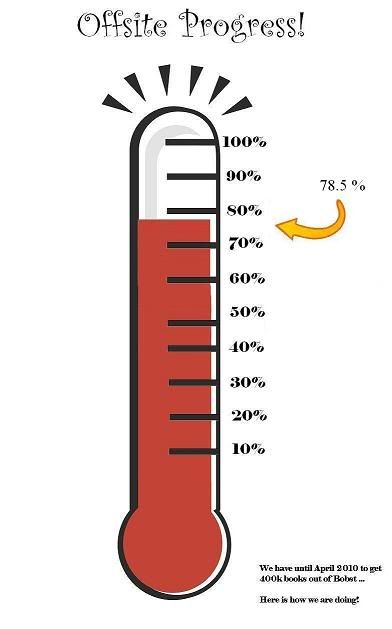 By now the story is old hat: we experienced a catastrophic systems failure for the two weeks following Thanksgiving because of some planned work to the university's cogeneration plant (the digging over by Courant). We receive heating and cooling from that plant, and they had to take our cooling offline for some reason. While the work was planned, it was started several hours earlier than agreed to, and somehow we weren't given the auxiliary cooling units we needed for our server room. By the time we were alerted that something was wrong, temperatures in our server room had risen to dangerous levels. Long story short: Aleph quite literally cooked. The situation was complicated by one day of "up time" on Friday, December 4th, for which all transactions were lost. (Note: The image at left was pulled off of another blog, and isn't an actual pic of what happened over Thanksgiving!)
By now the story is old hat: we experienced a catastrophic systems failure for the two weeks following Thanksgiving because of some planned work to the university's cogeneration plant (the digging over by Courant). We receive heating and cooling from that plant, and they had to take our cooling offline for some reason. While the work was planned, it was started several hours earlier than agreed to, and somehow we weren't given the auxiliary cooling units we needed for our server room. By the time we were alerted that something was wrong, temperatures in our server room had risen to dangerous levels. Long story short: Aleph quite literally cooked. The situation was complicated by one day of "up time" on Friday, December 4th, for which all transactions were lost. (Note: The image at left was pulled off of another blog, and isn't an actual pic of what happened over Thanksgiving!)This recent downtime got me thinking about the ways we use Aleph. The generic term for a system like Aleph is an integrated library system, or ILS. Integrated because it consists of several modules that all talk to each other. While GEAC was also an ILS, we use Aleph in a much more "integrated" way.
Not only does the library perform the expected functions on Aleph (cataloging, reserves processing, circulation, etc.) but we are using the system in new ways: LP relies on Aleph to check that users are in good standing before they
 are issued a carrel or locker. Stacks retrieves material for both Reserves and ILL, and not knowing if books were offsite or here at Bobst wasted a lot of their time. While ILL could still place and fill requests, they had to devise alternate workflows for tracking their checkouts. Circulation used the excellent offline circulation module that Aleph offers, but could only perform a fraction of their services. Reserves switched to a totally manual method of circulation, which, although it worked beautifully, was reminiscent of my trips to the Norwell Public Library as a child in the early '70s.
are issued a carrel or locker. Stacks retrieves material for both Reserves and ILL, and not knowing if books were offsite or here at Bobst wasted a lot of their time. While ILL could still place and fill requests, they had to devise alternate workflows for tracking their checkouts. Circulation used the excellent offline circulation module that Aleph offers, but could only perform a fraction of their services. Reserves switched to a totally manual method of circulation, which, although it worked beautifully, was reminiscent of my trips to the Norwell Public Library as a child in the early '70s.Midway through this downtime, I actually started to think that the fact that this systems failure brought operations to a crawl was...actually GOOD. Good? Really? Sure, it was a ton of extra work for much less than usual productivity and service. Sure, it took it's toll on everyone. Sure, some departments are likely to have clean-up through the better part of next semester.
Call me crazy, but I can't help think about the up time. In the grand scheme of things, even with a failure of this magnitude, Aleph is up 99% of the time. While no system is perfect and we are more than aware of Aleph's quirks, it does do some things well, too. During the up-time we are using the system to its fullest to provide excellent service to our users. We have embraced what it has to offer in a way that is exponentially richer than our use of previous systems. I think that's pretty terrific, and only stands to grow as our understanding of the system grows, and the system itself offers more and more useful tools.
On Tuesday Access Services will join our close colleagues from Avery Fisher Center and BLCC to breathe a collective sigh of relief that the system is back up, and that we survived this very poorly timed down time. At that time, you are welcome to call me crazy in person. I won't try to convince you of my opinion on this, because I'll be too busy enjoying the celebration.

